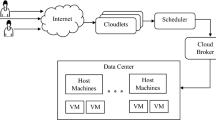Abstract
The optimization of task scheduling in cloud computing is built with the purpose of improving its working efficiency. Aiming at resolving the deficiencies during the method deployment, supporting algorithms are therefore introduced. This paper proposes a particle swarm optimization algorithm with the combination of based on ant colony optimization, which proposes the parameter determination into particle swarm algorithm. The integrated algorithm is capable of keeping particles in the fitness level at a certain concentration and guarantee the diversity of population. Further, the global best solution with high accurate converge can be exactly gained with the adjustment of learning factor. After the implementation of proposed method in task scheduling, the scheme for optimizing task scheduling shows better working performance in fitness, cost as well as running period, which presents a more reliable and efficient idea of optimal task scheduling.






Similar content being viewed by others
References
Chellappa, R.K.: Intermediaries in Cloud-Computing: A New Computing Paradigm, INFORMS Annual Meeting, Dallas, 26–29 Oct 1997
Takabi, H.: A semantic based policy management framework for cloud computing environments, Doctor Dissertation, University of Pittsburgh, Pittsburgh (2013)
Yi, P.: Peer-to-peer based trading and file distribution for cloud computing, Doctor Dissertation, University of Kentucky, Lexington (2014)
Egedigwe, E.: Service quality and perceived value of cloud computing-based service encounters: evaluation of instructor perceived service quality in higher education in Texas, Doctor Dissertation, Nova Southeastern University, Fort Lauderdale (2015)
Rochwerger, B., Breitgand, D., Levy, E., et al.: The reservoir model and architecture for open federated cloud computing. IBM J. Res. Dev. 53(4), 1–17 (2009)
Nurmi, D., Wolski, R., Grzegorczyk, C. et al.: The eucalyptus open-source cloud-computing system. In: Proceeding of the CRID, pp. 124–131 (2009)
Ochwerger, B., Breitgand, D., Levy, E., et al.: The reservoir model and architecture for open federated cloud computing. IBM J. Res. Dev. 53(4), 1–17 (2009)
Li, J.Y., Mei, K.Q., Zhong, M., et al.: Online optimization for scheduling preemptable tasks on IaaS cloud systems. J. Parallel Distrib. Comput. 72(2), 666–677 (2012)
Etminani, K., Naghibzadeh, M.A.: Min-min max-min selective algorithm for grid task s cheduling. In: 3rd IEEE/IFIP International Conference in Central Asia on Internet. IEEE Computer Society, Washington, pp. 1–7 (2007)
Xie, L.X.: Analysis of service scheduling and resource allocation based on cloud computing. Appl. Res. Comput. 32(2), 528–531 (2015)
Shi-yang, Y.: Sla-oriented virtual resources scheduling in cloud computing environment. Comput. Appl. Softw. 32(4), 11–14 (2015)
Guo, L., Zhao, S., Shen, S., et al.: Task scheduling optimization in cloud computing based on heuristic algorithm. J. Netw. 7(3), 547–553 (2012)
Li, J., Peng, J., Cao, X., et al.: A task scheduling algorithm based on improved ant colony optimization in cloud computing environment. Energy Proc. 10(13), 6833–6840 (2011)
Kennedy J, Eberhart R. Particle swarm optimization[C], Proceedings of IEEE International Conference on Networks, 1995: 39-43
Graham, J.K.: Combining particle swarm optimization and genetic programming utilizing LISP, Master Dissertation. Utah State University, Logan (2005)
Juang, C.F.: A hybrid of genetic algorithm and particle swarm optimization for recurrent network design. IEEE Trans. Syst. Man Cybern. 34(2), 997–1006 (2004)
Eberhart, R., Shi, Y.: Comparing inertia weights and constriction factors in particle swarm optimization. In: Proceedings of the 2000 Congress on Evolutionary Computation, pp. 84–88 (2000)
Zuo, L., Shu, L., Dong, S., Zhu, C., Hara, T.: A multi-objective optimization scheduling method based on the ant colony algorithm in cloud computing. IEEE Access 3, 2687–2699 (2015)
Deneubourg, J.L., Pasteels, J.M., Verhaeghe, J.C.: Probabilistic behaviour in ants: a strategy of errors. J. Theor. Biol. 105(2), 259–271 (1983)
Dorigo, M.: Optimization, learning and natural algorithms. Doctor Dissertation, Pilotenico di Milano, Italie (1992)
Prakasam, A., Savarimuthu, N.: Metaheuristic algorithms and probabilistic behaviour: a comprehensive analysis of ant colony optimization and its variants. Artif. Intell. Rev. 45(1), 97–130 (2016)
Cha an-min.: Research on task scheduling based on particle swarm and ant colony algorithm for cloud computing. Master Dissertation, Nanjing University of Aeronautics and Astronautics, Nanjing (2016)
Jiang, M., Luo, Y.P., Yang, S.Y.: Stochastic convergence analysis and parameter selection of the standard particle swarm optimization algorithm. Inf. Process. Lett. 102(1), 8–16 (2007)
Gutjahr, W.J.: A graph-based ant system and its convergence. Future Gener. Comput. 16(8), 873–888 (2000)
Author information
Authors and Affiliations
Corresponding author
Rights and permissions
About this article
Cite this article
Chen, X., Long, D. Task scheduling of cloud computing using integrated particle swarm algorithm and ant colony algorithm. Cluster Comput 22 (Suppl 2), 2761–2769 (2019). https://doi.org/10.1007/s10586-017-1479-y
Received:
Revised:
Accepted:
Published:
Issue Date:
DOI: https://doi.org/10.1007/s10586-017-1479-y




